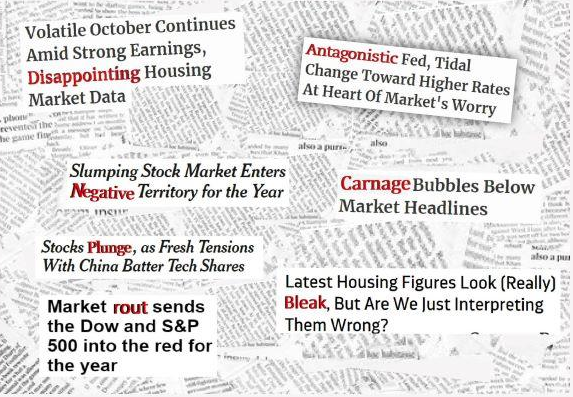Written by: Kyle Thompson, CFP®, CPA
The picture above shows the results from a quick Google search for “October 2018 Market Headlines”. As expected, negative headlines dominated this past month. The word choices such as antagonistic, bleak, tidal, carnage, slumping, negative, plunge, batter, rout, etc. reminded me that headlines are all about click-bait and getting eyeballs rather than providing sound investing advice. For investors, these headlines often create an emotional stir, or worse yet, provoke reaction that is counter to the long-term views that we believe investors should hold.
Over my tenure as a financial planner, I have become more interested in the psychology of investing. Our brains are comprised of two systems, which Daniel Kahneman calls “System 1” and “System 2”. System 1 is our “fight or flight” response. It is the part of the brain driven by our gut reactions and allows our brain to make mental shortcuts fast and in an unconscious manner. System 2, on the other hand, is the rational component of our brain. System 2 utilizes slow and conscious thought and allows us to make complex decisions.As advisors, we live in the System 2 world and use tools that provide rational support for long-term investment decisions. During calm (rational) markets, it is often easy for Investors to understand the reasons for staying the course. However, as volatility returns (such as in October 2018) our System 1 mental shortcuts take over, and as humans we want to flee the situation. This emotional response is further exacerbated by the onslaught of negative headlines from the 24/7 news cycle that we’re fed.Statistics show that 70% of all economic decisions are based on System 1 - psychological and emotional reactions. Ironically, the financial services tools that we use are designed to provide rational results which are driven from System 2. This creates a disconnect between how investors behave (System 1) and how advisors coach (System 2). My hope is that by sharing behavioral finance in conjunction with economic finance investors can begin to view market volatility as a friend rather than a foe.If I can, I would like to share a personal story to help illustrate this. For years I had been terrified to fly. Soon after graduating college I was forced to take my first flight on a business trip. It was just a short flight from Indy to Chicago, but I stayed up all night worrying about what could go wrong instead of focusing on the fact that flying is the safest mode of transportation in the world. I survived that flight, but my attitude towards flying did not improve and reconfirmed that 39,000 feet was not my comfort zone. Anytime I had the option to drive versus fly, I would.Related: What Does Every Woman Want? An Advisor Who ‘Gets It’Related: Know the Facts Before Considering an Annuity?However, over the years, my attitude towards flying has changed. Today, our family has a rule that if the state doesn’t border Indiana we fly. How was I able to change? What allowed my System 2 rational thinking to override my System 1 fear? Much of this change was driven by me shifting the narrative of how I thought.Instead of thinking or reading about what could go wrong I started listening to industry experts as to why you should fly. I am also lucky to have two clients who are pilots and another who is an airline mechanic. Over the years they have all reiterated the safety of airlines and the backup plans upon backup plans that are in place to keep passengers safe. I also started watching the flight attendants. If you look around the cabin, you’ll notice that their demeanor is never impacted by turbulence and they continue about their job as if nothing is happening. They know the aircraft is built to withstand the volatility of turbulence and thus their System 1 never engages – they have nothing to fear.I share this story to simply connect the dots with investing. When volatility takes root, we at Market Street remain calm and view it as an opportunity to invest at lower prices and allow the markets to reset so we can reach new highs at some point in the future. There will be turbulent days ahead, but I hope you will allow us to be your flight attendant and observe us as we display a level of calmness in the midst of the media madness. Your financial plan and investment allocation have been customized to help you absorb market risk while staying fully invested in all market cycles.Market Volatility ≠ Your Volatility if you can disengage System 1 and remain disciplined.If you would like to take a deeper dive into the current trends that have impacted the markets in the short-term such as interest rates, tariffs, trade-wars, etc., feel free to reach out to your lead advisor and we will be happy to help.Otherwise sit back, relax, and enjoy your flight.


